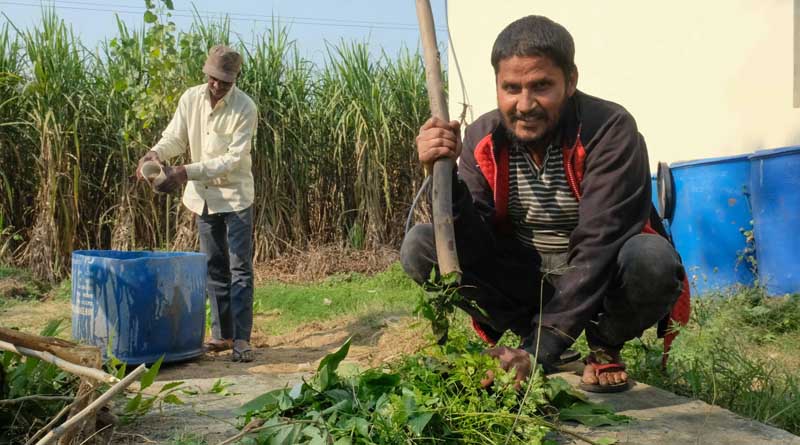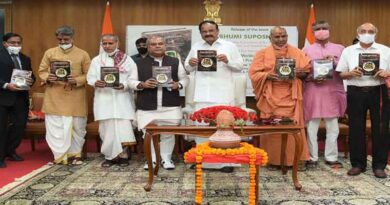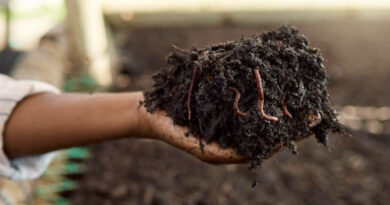It’s Time to Turn Back the Clock, & Adopt Natural Farming to Save Our Soil!
Guest author: Chandrakant Kumbhani, Vice President, Community Development Initiatives, Ambuja Foundation
Natural Farming processes are required to restore soil health and to produce fresh healthy crops at lower cost.
05 September 2023, New Delhi: Modern agricultural practices, by and large, revolve around the application of synthetic and chemical pesticides and fertilizers – products that adversely impact the health of farmers and end consumers who eat the food produced this way. Additionally, untold damage is being done to our dwindling water supplies, environmental ecosystems, and perhaps most frightening of all, our finite soil.
Whilst the Green Revolution catapulted us out of the grips of famine, its long-term practices led to many unsustainable agricultural practices like this – the rampant use of chemicals, monocropping, heavy irrigation, and the use of bio-engineered high-yielding seeds. These current methods of helping farmers enhance yields are at the root of India’s burgeoning soil problem.
The truth of the matter is, that India’s soil has become so contaminated, stripped of its carbon, and depleted of all the precious nutrients, microbes, and natural goodness, that we are facing a situation where the soil required to grow food, will literally, run out. Scientists estimate that with current rates of soil degradation (along with erosion) we’ve only got about 50 years of topsoil left.
Therefore, now more than ever, we need to revolutionize farming – veering away from the application of inorganic inputs to boost yield, and reverting to natural and ancient farming practices (once so prevalent in India) that work in harmony with the overall environment, and replenish, instead of destroy, our soil.
Reverting to Natural ‘Spiritual’ Farming Practices
Natural farming is a chemical-free traditional farming method. It is a diversified farming system that integrates crops, trees, and livestock – allowing farmers to optimize functional biodiversity to protect crops and boost yield. If done effectively, natural farming enhances farmer incomes, whilst delivering many other benefits – such as the restoration of soil fertility and wider environmental health!
Padma Shri–awardee Subhash Palekar, an agricultural scientist who pioneered the concept of natural farming in the country, drew his inspiration from ancient Indian farming techniques, at the heart of which are cow dung and cow urine. Heavily inspired by the Vedas, Upanishads, and other ancient scriptures, Palekar refers to his system as ‘spiritual farming’ – with the cow upheld as a key provider of essential nutrients, and ayurvedic plants and fruits providing much-needed ingredients to create decoctions for treating crop problems.
Going further back, according to the Vedas, producing healthy, nutritious food is easier than we think! Nature has perfected its cultivation technique which is far superior to anything that man has invented. Nature was creating food long before man even walked the earth – we simply need to nurture this intricate natural system.
Natural Farming Practices to Save Our Soil
The beauty of natural farming is that it is largely based on harnessing natural, on-farm resources, and reducing the reliance on external inputs so prevalent in modern farming. Biomass recycling in particular biomass mulching; the use of on-farm cow dung and urine formulations; maintaining soil aeration and excluding all synthetic chemical inputs are core natural farming techniques that reduce the cost of farming, restoring nutrients to the soil and reducing the toxic footprint of farming.
Natural farming is regenerative and is very focused on building soil health through techniques like composting and adding animals into crop rotation practices. Natural farming uses many different techniques to create and maintain a healthy soil structure rich in nutrients, without the use of synthetic fertilizers or pesticides. These techniques include:
· Crop rotation.
· The use of compost.
· Green manure, cover cropping, and mulching.
· No-till or low-till techniques.
· Limited to zero pesticide use and sustainable pest management techniques, such as using buffer zones and beneficial insects.
· Adding animals on pasture/animal manure to farm systems and crop rotation.
Additionally, five main strategies are adopted to optimize yields in natural farming:
· Beejamrit – Seed treatment with cow dung and urine-based formulations (culture of micro-organisms & hormones).
· Jeevamrit – Ensuring soil fertility through cow dung and urine concoctions (best culture of fertility creating micro-organisms).
· Aachhadan (Mulching) – Applying a layer of crop residues to the soil surface to prevent water evaporation and contribute to soil humus formation.
· Whapasa – Soil aeration mixed with water vapors through a favorable microclimate in the soil.
· Plant Protection – Spraying biological concoctions that prevent pests, disease, and weed problems, protecting the plant and improving soil fertility.
Whilst many states in India are already following natural farming and have developed successful models (Andhra Pradesh, Chhattisgarh, Kerala, Gujarat, Himachal Pradesh, Jharkhand, Odisha, Madhya Pradesh, Rajasthan, Uttar Pradesh, and Tamil Nadu are among the leading states) currently, the acceptance and adoption of natural farming systems are at the very early stages. Whilst they are gradually gaining acceptance among the farming community, there is much work left to be done!
Conclusion
Adoption of organic or natural farming – once so prevalent in India’s ancient agricultural history – is the need of the hour. And whilst there are many hopeful efforts across the country, taking an organic approach to the growth of natural farming in India, will sadly, not work.
As a nation, we need massive, radical action on this pressing issue. India’s current unsustainable food production systems require transformation, and for that, we need widespread promotion of an alternative path for farmers. One where soil health is protected, food is more nutritious, water is optimized and ecosystems are nurtured – so that farming, and the precious soil it relies upon for the production of food and fiber, survives to meet the needs of generations to come. Natural Farming, along with other ancient farming practices, is the way forward.
Also Read: Swaraj launches 5 new tractors in the 40 to 50 HP category; Onboards MS Dhoni as brand ambassador
(For Latest Agriculture News & Updates, follow Krishak Jagat on Google News)















